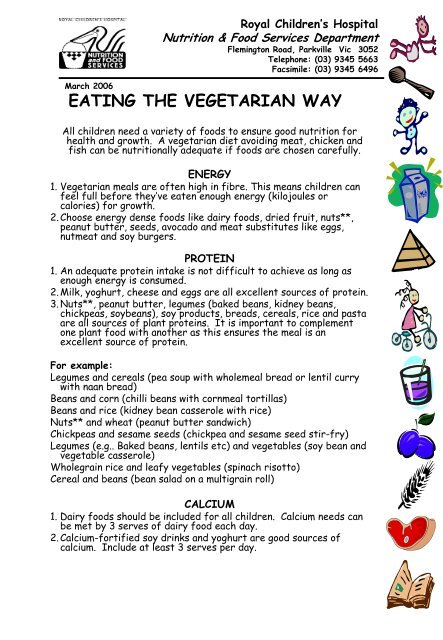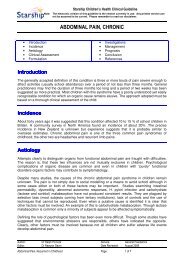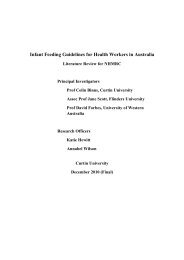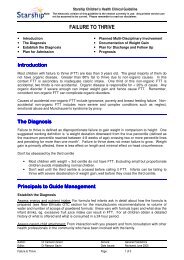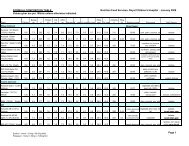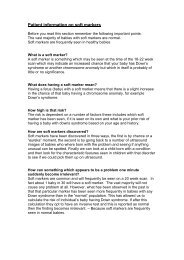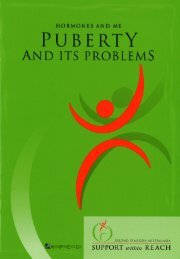Eating the vegetarian way - Flourish Paediatrics
Eating the vegetarian way - Flourish Paediatrics
Eating the vegetarian way - Flourish Paediatrics
Create successful ePaper yourself
Turn your PDF publications into a flip-book with our unique Google optimized e-Paper software.
Royal Children’s HospitalNutrition & Food Services DepartmentFlemington Road, Parkville Vic 3052Telephone: (03) 9345 5663Facsimile: (03) 9345 6496March 2006EATING THE VEGETARIAN WAYAll children need a variety of foods to ensure good nutrition forhealth and growth. A <strong>vegetarian</strong> diet avoiding meat, chicken andfish can be nutritionally adequate if foods are chosen carefully.ENERGY1. Vegetarian meals are often high in fibre. This means children canfeel full before <strong>the</strong>y’ve eaten enough energy (kilojoules orcalories) for growth.2. Choose energy dense foods like dairy foods, dried fruit, nuts**,peanut butter, seeds, avocado and meat substitutes like eggs,nutmeat and soy burgers.PROTEIN1. An adequate protein intake is not difficult to achieve as long asenough energy is consumed.2. Milk, yoghurt, cheese and eggs are all excellent sources of protein.3. Nuts**, peanut butter, legumes (baked beans, kidney beans,chickpeas, soybeans), soy products, breads, cereals, rice and pastaare all sources of plant proteins. It is important to complementone plant food with ano<strong>the</strong>r as this ensures <strong>the</strong> meal is anexcellent source of protein.For example:Legumes and cereals (pea soup with wholemeal bread or lentil currywith naan bread)Beans and corn (chilli beans with cornmeal tortillas)Beans and rice (kidney bean casserole with rice)Nuts** and wheat (peanut butter sandwich)Chickpeas and sesame seeds (chickpea and sesame seed stir-fry)Legumes (e.g.. Baked beans, lentils etc) and vegetables (soy bean andvegetable casserole)Wholegrain rice and leafy vegetables (spinach risotto)Cereal and beans (bean salad on a multigrain roll)CALCIUM1. Dairy foods should be included for all children. Calcium needs canbe met by 3 serves of dairy food each day.2. Calcium-fortified soy drinks and yoghurt are good sources ofcalcium. Include at least 3 serves per day.
IRON1. Fortified breakfast cereals, wholegrain breads, legumes (bakedbeans, lentils etc) and green leafy vegetables are all good sourcesof iron.2. The body can not absorb iron from plant foods as well as it canabsorb iron from animal foods so it is better if <strong>the</strong>se foods areeaten at <strong>the</strong> same meal with foods containing Vitamin C (e.g., citrusfruits, kiwi fruit, fruit juice, tomatoes, capsicum).OTHER NUTRIENTS THAT MAY BE LIMITED INVEGETARIAN DIETS• ZincFound in eggs, dairy foods, nuts**, peanut butter, whole grains,wheatgerm, soy cheese, tofu and tempeh.• Vitamin B12Only found in animal foods.Dairy foods and eggs are good sources.Plant sources include fortified tofu and soy drinks and Marmite.A B12 supplement is recommended if dietary intake is inadequate.SAMPLE MEAL PLAN• BreakfastIron-fortified breakfast cereal and milk (e.g.. Weet-Bix)Toast with butter/margarine and cheese/peanut butter/vegemiteMilk or Fruit juice• Morning teaFruitDry biscuits and cheese• LunchRoll with egg salad/cheese and Vegemite/cheese and salad• Afternoon teaTub of yoghurt/glass of milk/fruit smoothieFruit or vegetable muffin• DinnerTomato and mushroom omelette with fresh salad ORPasta with tomato sauce and Parmesan cheese ORLentil curry with flat bread (naan) and yoghurtMilkCustard or yoghurt with fresh or canned fruit (in natural juice)• SupperMilk drinkToasted English muffin, bread or crumpet with jam**Whole nuts are not suitable for children under 5 years of agedue to <strong>the</strong> risk of choking. Use nut pastes instead.


